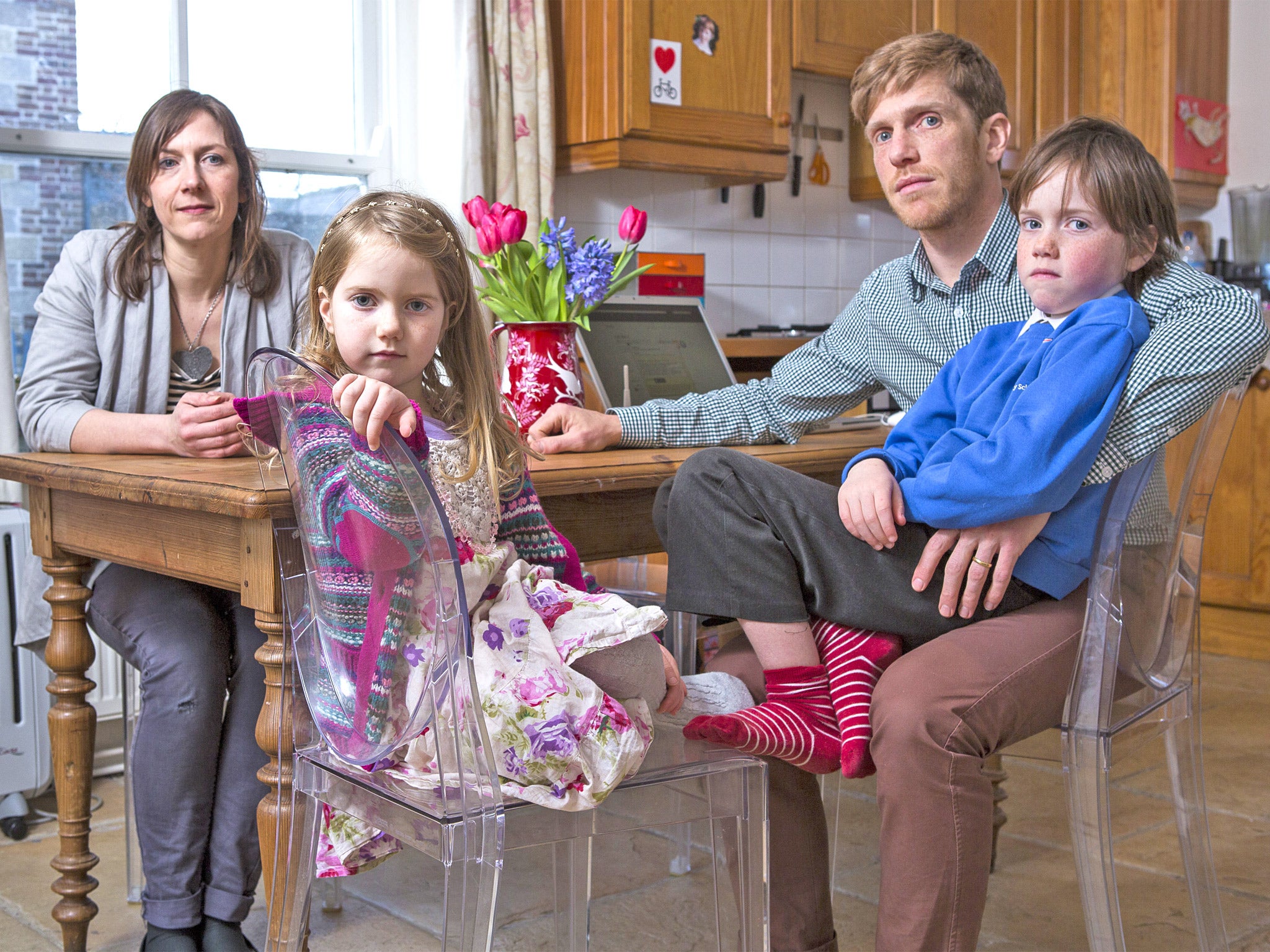An age-old problem: Why can't summer-born children start school later?
It's long been proven that summer-born children are disadvantaged throughout their education – socially and academically

Belle McLoughlin is a quiet little girl who loves playing elaborate make-believe games with her dolls and teddies. At four-and-a-half, Belle goes to nursery three days a week, and plays with her older brother, Gabriel, when he arrives home to their thatched cottage from the village school.
Her parents were delighted when the headteacher said Belle could join her brother at the village primary, starting in reception this September. But then the family's hopes were dashed earlier this month when the local authority ruled that Belle must skip reception and go straight into year one.
The McLoughlins' application was different than most – yes, they want a reception place for Belle this coming September. But Belle turned four last August and under normal circumstances would already be halfway through her first year of school. Instead, she attends nursery for 16 hours a week and spends the rest of her time at home.
"We always knew we didn't want Belle to start school when she'd just turned four. Our son has an October birthday. He loved school and was really ready to start. We could just see that Belle wasn't anywhere near ready," says Ms McLoughlin, 36, a copywriter from Wiltshire.
The McLoughlins are among a growing number of families who are so concerned at the prospect of their summer-born offspring starting school too early that they are asking to delay for a year. This is legally their right – children do not have to be in education until the term after their fifth birthday. But if they delay, they forfeit the right to a place in reception.
Her mother breaks down in tears as she describes the dilemma that faced her and many other families. "This isn't the start we wanted for our daughter. It is not right that our only choices seem to be between her starting school far too young or for her to miss a complete year of school. That is no choice at all."
Research has shown that being born at the end of the school year – whether that be August in England or December in Singapore and Tasmania – means a child is likely to score less well in reading, writing and maths tests, and also be more likely to be assessed as having special educational needs or be bullied.
A 2011 study by the Institute of Fiscal Studies (IFS) concluded that August-born children in England were likely to achieve "substantially" lower scores in national achievement tests and other assessments, be two-and-a-half times more likely to report being unhappy at school, and twice as likely to report being bullied at the age of seven. With research like this in mind, a growing number of parents of summer-borns are doing battle with their local education authorities in an attempt to change their children's educational prospects.
This month, a campaign group backed by more than 500 families published a report into what it describes as "a nationwide scandal of flouted primary legislation, inconsistent policies and practices, and a detrimental back-door lowering of England's compulsory school age by up to a year for some children."
It claims that unclear admissions rules have left parents facing a Hobson's choice: either send their child to school aged four or delay until five and be forced to go straight into year one. Families who delay may also find that there are no year-one places available at popular schools and have to settle for a less popular choice.
Although the law requires all children to be in education by the term after their fifth birthdays, it also allows them to start earlier. The report claims that unclear admissions rules have allowed schools and local education authorities to effectively lower the school starting age to four by encouraging all children to start in the September after their fourth birthday.
The report by parent campaigners Michelle Melson and Pauline Hull calls for all parents to have the right to delay and still be able to have a reception place.
"We are not trying to gain an advantage or wanting our children to be first; we are trying to avoid the very well-documented disadvantage for some children – and to ensure that any resulting systemic changes don't then unfairly disadvantage non-summer-born children, too," Hull says.

Their study found some local education authorities were breaching the law by adopting blanket policies of sending all five-year-olds straight into year one. But even authorities that did follow the code by considering the individual merits of the case still almost always rejected parents' requests.
It is against this backdrop that some parents are going to increasingly desperate lengths to avoid having to send their children to school too young.
But some experts believe that allowing some children to delay starting school can be unfair to others, who then become the youngest in the class. They complain that while delaying may give an individual child an advantage, it does nothing to help the others. They have called for a radical shake-up of the testing and exam system to adjust the results according to age. School league tables and university entrance would be decided by the age-adjusted cores.
"Delaying entry may be beneficial for some individual children, but it is not the answer for the education system as a whole, as one child will always be the youngest in the class," Ellen Greaves, a research economist at the IFS, says. "Allowing parents to delay their child's entry to school would increase the age range in some classes, which may make teaching harder and put the youngest in the class at more of a disadvantage."
Greaves warns that not all children benefit from delayed entry, with research in the US suggesting that it may do some children harm. Parents' anxiety about the well-being of their summer-born children has been exacerbated by research showing that the negative effects of an early school start can be long lasting.
The IFS study found that August-born children were 20 per cent less likely to attend an elite Russell group university aged 19 than their September-born class mates, and were 20 per cent more likely to study for vocational qualifications (rather than academic subjects) if they stayed on after 16.
However, any negative effects do not seem to last into adulthood – employment prospects and earnings are unaffected.
Christina Clark, 42, a former teacher from Wimborne in Dorset, wishes she had never sent her eldest son, Jordan, now 18, to school when he had just turned four. Jordan, whose birthday is 31 July, struggled and became disengaged from learning after a "disastrous" school start, his mother says. She believes that he has only now begun to overcome the legacy of that bad beginning.
The mother-of-five says: "He just wasn't ready for school at four. He just did not seem interested in academic things at all. He went to a playschool, but I had a gut instinct that he wasn't ready to start school. When he started, it was a disaster. He just never seemed happy."
Jordan was diagnosed with mild attention deficit disorder and was put on the special needs register. But his mother believes he was misdiagnosed and that the only problem was that he had become disengaged with learning following his difficult school start.
Clark did ask about delaying school, but says that "all the advice was that he would miss out socially and then have problems fitting into the class. Being our first child, it seemed I was going to do more damage by deferring him".
Today, Jordan is studying for a degree in music production at the University of Central Lancashire. He recalls: "I think I was just too young. I couldn't concentrate and I was too tired to be there – when I started, I still wanted a sleep in the day. It gives you a bad impression of school. I just never liked school. I was conscious of being the youngest all the way through school.
Looking back, I would have been happier if I could have been in the year below, as I always got on better with that year group. Now I'm at university things are different. I am studying what I want and I really enjoy going to lectures. I'm still the youngest in the year and that was daunting at first. But it really doesn't matter. I think teachers need to be aware of the difficulties the youngest children can have and take them into consideration."
The Department for Education argues it has revised the schools admissions code to make it easier for parents of summer-born children to delay school entry. It also published new guidance last summer telling local authorities there is no legal barrier to admitting children outside their normal year group.
But the families behind the report argue that this does nothing to solve the problem, as the code does not give parents the right to a reception place, only the right to request it.
Stefan Richter, 40, who runs a software business in Wiltshire, is one of only a tiny number of parents who won this battle. His youngest daughter, Louisa, was born on 26 August 2009 and was expected to start school last September, a week after her fourth birthday. But unusually, Louisa will stay at nursery for an extra year and then is guaranteed a place in the reception class this coming September.
Richter says he has no concerns about his daughter delaying her school start. "We knew Louisa would have coped at four, but why cope when she may thrive the following year? I think the question is not what is wrong with the child, but what is wrong with the system.
"It's what we think is in Louisa's best interest, with academic achievement coming very low on the list of objectives. It's simply about the child being happy."
Join our commenting forum
Join thought-provoking conversations, follow other Independent readers and see their replies
Comments
Bookmark popover
Removed from bookmarks